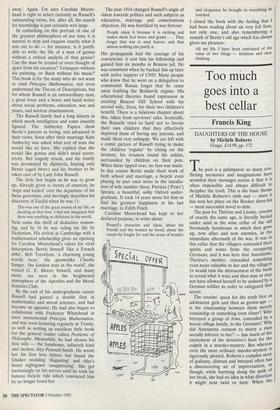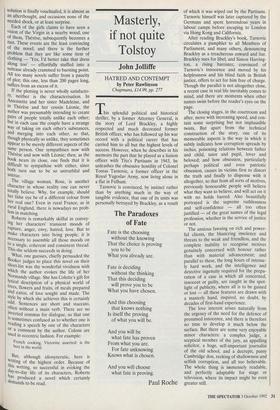Too much goes into a best cellar
Francis King
DAUGHTERS OF THE HOUSE by Michele Roberts Virago, £14.99, pp. 172 The past is a palimpsest: so many con- flicting memories and imaginations have scrawled their messages across it that it is often impossible and always difficult to decipher the truth. This is the basic theme of Michele Roberts's sixth and — since it has won her place on the Booker short-list — most successful novel to date.
The past for Therese and Leonie, cousins of exactly the same age, is literally buried under sand in the wine cellar of the old Normandy farmhouse in which they grew up, now allies and now enemies, in the immediate aftermath of the war. It was In this cellar that the villagers concealed their spirits and wines from the occupying Germans; and it was here that Antoinette, Therese's mother, concealed something even more valuable to her and the villagers (it would ruin the denouement of the book to reveal what it was) and then may or may not have allowed herself to be seduced by a German soldier in order to safeguard that secret.
The cousins' quest for the truth first as adolescent girls and then as grown-ups — is the relationship between them merely cousinship or something even closer? Who betrayed a group of Jews, concealed by a heroic village family, to the Germans? Why did Antoinette consent to marry a man socially inferior to her? — has much of the excitement of the detective's hunt for the culprit in a murder-mystery. But whereas even the most ordinary murder-mystery is rigorously plotted, Roberts's complex story of jealousy, distrust and betrayal often has a disconcerting air of improvisation, as though, while hurrying along the path Of her book, she had no idea in what direction it might next twist or turn. When the
solution is finally vouchsafed, it is almost as an afterthought, and occasions none of the needed shock, or at least surprise. Each of the girls claims to have seen a vision of the Virgin in a nearby wood; one of them, Therese, subsequently becomes a nun. These events are the least convincing of the novel; and there is the further problem that they are like some item of clothing — `Yes, I'd better take that dress along too' — effortfully stuffed into a suitcase already crammed to bursting point. All too many novels suffer from a paucity of plot; this one, less than 200 pages long, suffers from an excess of it.
If the plotting is never wholly satisfacto- ry, neither is the characterisation. In Antoinette and her sister Madeleine, and in Therese and her cousin Leonie, the author was presumably intending to create pairs of people totally unlike each other; but in each case the couple have a strange way of taking on each other's substances, and merging into each other, so that, though physically so unlike, they sometimes appear to be merely different aspects of the same person. One sympathises now with Therese and now with Leonie; then, as the book nears its close, one finds that it is difficult to sympathise with either, since both turn out to be so untruthful and untrue.
The village woman, Rose, is another character in whose reality one can never totally believe. Why, for example, should her false eye be of a different colour from her real one? Even in rural France, as in rural England, there is nowadays no prob- lem in matching. Roberts is remarkably skilful in convey- ing her characters' transient moods of rapture, anger, envy, hatred, love. But to make characters into living people, it is necessary to assemble all those moods on to a single, coherent and consistent thread. This she seldom succeeds in doing. What, one guesses, chiefly persuaded the Booker judges to place this novel on their short-list was the wonderful vividness with which the author evokes the life of her Normandy village. She has Colette's gift for lyrical description of a physical world of trees, flowers and fruits, of meals prepared and eaten, of love sought and made. The style by which she achieves this is certainly odd. Sentences are short and staccato, often without a main verb. There are no inverted commas for dialogue, so that one is sometimes confused as to whether one is reading a speech by one of the characters or a comment by the author. Colons are used in eccentric fashion. For example:
French cooking, Victorine asserted: is the best in the world.
But, although idiosyncratic, here is writing of the highest order. Because of this writing, so successful in evoking the day-to-day life of its characters, Roberts has produced a novel which certainly demands to be read.



















































 Previous page
Previous page